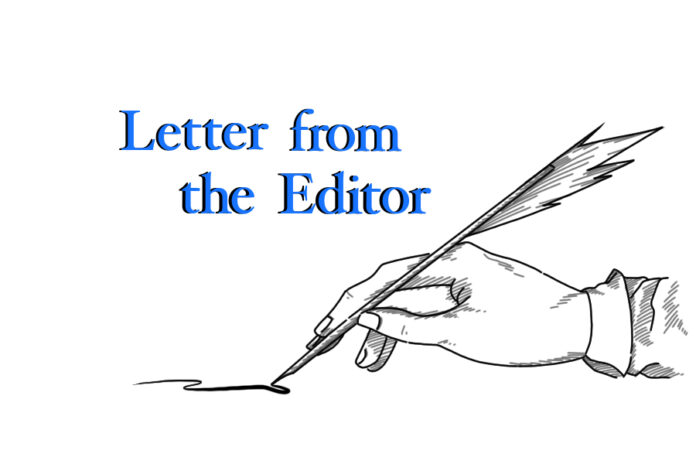Dear readers,
I’d like to introduce myself — my name is Anjini Venugopal and I am the editor-in-chief of The California Aggie. I am pursuing a double major in cognitive science and linguistics, and I will be starting my third year this fall. I joined The Aggie as a features writer in the fall of my freshman year and served as the assistant features editor starting that spring. Student journalism is crucial, and I am incredibly grateful and honored — but mostly humbled — to lead the staff of this newspaper I love so much.
The prologue to the UC Davis Principles of Community begins with a description of the university’s “diverse community comprised of individuals having many perspectives and identities.” In applying to The Aggie in the fall of my first year, I read and mulled over these principles, hoping to provide the perfect answer to the application question concerning the role of these principles in the newsroom and about my understanding of diversity and cultural competency.
As journalists, we report factual, timely news to inform our community. Equally importantly, we hold organizations and individuals accountable, and our work should inspire change. Our shared and individual experiences have shaped us to be who we are. Diversity strengthens us, both as empathetic individuals in our communities and also as journalists.
As The Aggie’s first diversity report — produced by former Campus News Editor Kenton Goldsby, former New Media Manager Hannan Waliullah and Campus News Editor Janelle Marie Salanga — has shown, The Aggie has a ways to go in terms of diversity. Although just over 50% of our staff completed the survey, the responses indicate that our staff is disproportionately made up of white students, as compared to UC Davis’ population. Diversity in our staff is vital, not only to ensure that we are reporting on and giving voice to individuals from a spectrum of backgrounds and identities, but also to allow for more thorough, responsible and nuanced reporting that reaches a broad audience. Like I said, we hold organizations and individuals accountable — and that includes ourselves.
Some initial steps The Aggie can and will take include more actively soliciting staff applications from cultural organizations and student resource centers by promoting our hiring through their listservs. Additionally, we will proactively advertise the opportunity to submit guest opinion pieces and letters to the editor. Implicit bias training through the University of California Learning Management System is now a requirement for all employees of The Aggie. We also are in the process of creating an outreach and engagement board that will work to address issues we identify in our newsroom. This board, which will consist of all editors, managers and directors responsible for hiring, will be open to anyone on staff who is interested. It will work to assess our outreach strategies, identify avenues to increase transparency and lay groundwork for potentially introducing a paid outreach director to our managing staff next year. It is important to foster an environment in which people feel comfortable to express issues they identify pertaining to diversity in the newsroom and the newsroom culture, discuss ways to address these and share these with all Aggie staffers. We are committed to publishing diversity reports at least once a year moving forward. These proposals are, of course, not comprehensive, but a starting point as we tackle the lack of diversity in our newsroom.
When I accepted the position of editor-in-chief in May, I spent a lot of time thinking about the role of journalism. It can be overwhelming how much happens in a day and it can be overwhelming how much happens in a year (especially this one), but remaining informed is crucial. Our staff is here to engage with the university and the greater Davis community. We strive to keep readers informed and up to date with breaking news, and to provide readers with content that promotes critical thinking and sparks productive conversation. I know how dedicated the staff of The Aggie is, and I guarantee we will uphold our journalistic integrity and work relentlessly to provide quality content.
I would be remiss not to add how grateful I am to my fearless predecessor Kaelyn Tuermer-Lee and the inimitable Hannah Holzer, who led The Aggie during the unprecedented months of Spring Quarter with grace. I hope to live up to the standards that they, and all those before them, have set.
I have no doubt that my answer to that application question was not perfect then, and it would be a hollow promise to say that we will attain perfection in our efforts to improve diversity in our newsroom within the year. That being said, we must keep growing and never stop asking how we can do and be better. We seek to answer questions and encourage dialogue, so whenever you have questions, comments or concerns, please do not hesitate to contact me at editor@theaggie.org.
Sincerely,
Anjini Venugopal
Editor-in-Chief





Diversity is more than skin deep. The ideological and class uniformity is at the very least relevant. It does not matter if the lead editor or other staff members fit into a subjective category of “of color” if they share the same class and political interests of their colleagues. You should feel as responsible for ensuring proper class representation as racial. At any rate, the division of white vs PoC is useless because it ignores the unique history of African-Americans in this country versus recent immigrant groups, many of the latter of which achieve incomes at a higher rate than their black and even white colleagues.
Spot on. You cannot pick and choose what dimensions of diversity are relevant while simultaneously claiming to value diversity.